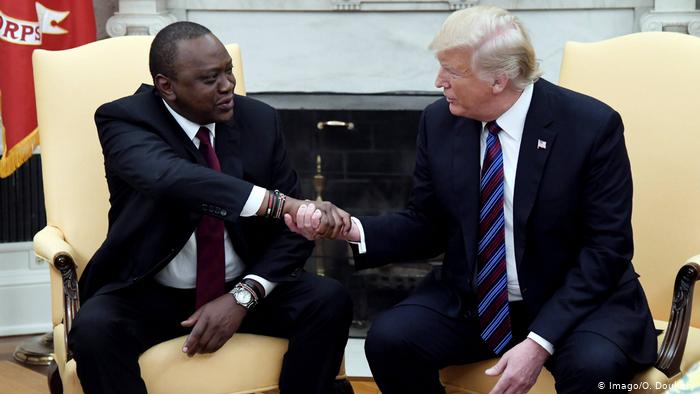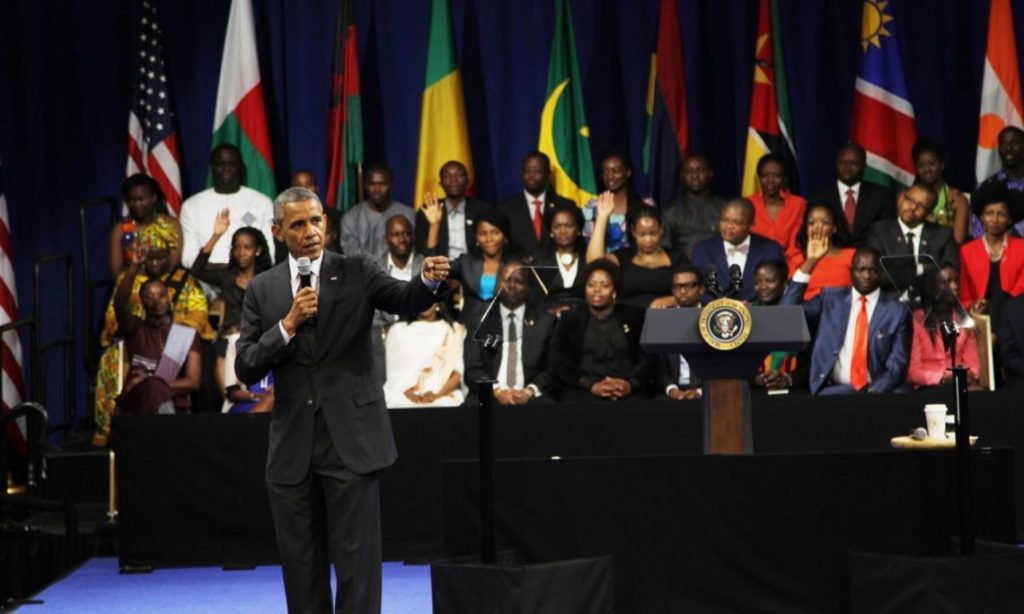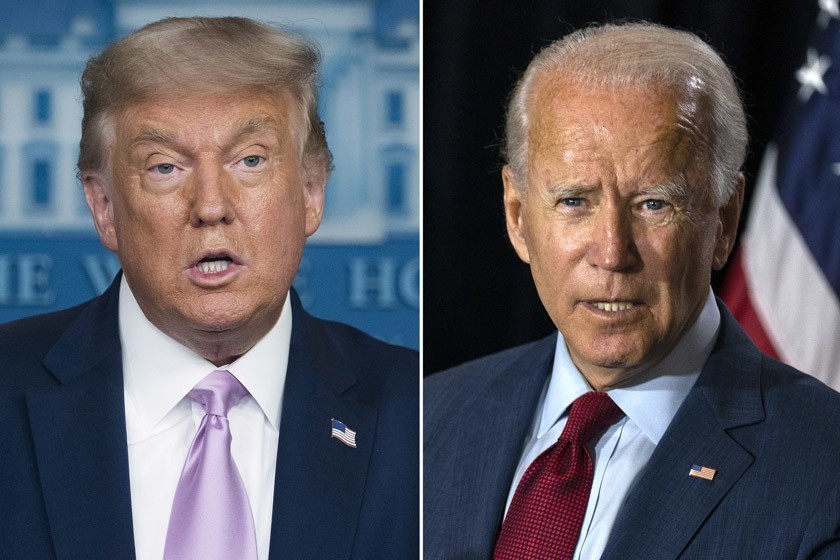Trump’s rhetoric versus Biden’s policies.
If ever words could summarize a story.
The most powerful country in the world is heading to the polls in an election that pits the incumbent President Donald Trump and former Vice President Joseph Biden, who served under Trump’s predecessor, Barack Obama – the first head of state with African heritage in the western world.
As usual, the election has an effect on any country in the world. America’s largest economy, powerful military, and strength of the dollar mean that every policymaker will be awaiting the results. But where do these two candidates stand on key issues affecting the continent?
Economy
Trade between the United States and the African continent has fallen sharply since the turn of the millennium. A rising China, a strengthening European Union, and now the United Kingdom that seeks to return to its British colonial heydays mean that trade statistics will further decline regardless of the occupant in the White House.
When Obama/Biden took office in 2008, trade between Africa and the U.S. stood at $100 billion, but by the time they left office, trade figures had fallen to $39 billion, according to U.S. agency USAID.
Biden’s vice presidency coincided with the launch of Power Africa, an initiative that his boss, Obama, touted in his many foreign visits to Africa. However, the initiative largely failed, the signature victory being the extension of the Bill Clinton era African Growth Opportunities Act (AGOA) in 2015, for a further ten years.
President Trump hasn’t concentrated much of his trade policies on Africa, apart from launching the Prosper Africa initiative that was largely focused on battling China’s influence on the continent rather than improving bilateral trade. That too hasn’t even taken off the ground.
With the U.S. now the largest oil producer in the world, whoever becomes president will not change a shrinking balance of trade with Africa.
His government has however maintained the free trade deal with Morocco – the only such deal in the continent and is negotiating one with Kenya, though talks hit a dead end when Trump’s administration demanded inclusion of a clause that would ban the government from supporting the Palestinian-driven Boycott Divestment and Sanctions (BDS) Movement against Israel in future.
Kenya’s refusal owed to the fact that six of its ten major trading partners are Muslim majority nations of Pakistan, the Islamic Republic of Iran, Saudi Arabia, the United Arab Emirates, Qatar, and Egypt.

Military
America’s war on drugs never touched African soil, but the war on terror belatedly did. Since the 9/11 attacks, the United States has increased military activities in Africa to combat terrorism and radicalization.
Under the Obama/Biden presidency, the Pentagon created a specific command for Africa – AFRICOM as part of its division of the world under its military command centers. Following a huge outcry from African leaders, AFRICOM’s headquarters were not placed on the continent but in Berlin, Germany, but that didn’t stop the unit from launching its first war on the continent. Ironically, the commander in chief was a son of the soil.
Libya quickly turned into a disaster after the toppling of Colonel Muammar Gaddafi, which rages on killing thousands and igniting a booming slave trade. There was also the introduction of drone strikes in Somalia, Chad, Niger, Mali, and Burkina Faso through the same period that coincided with the strengthening of terror groups like Al Shabaab, ISIS-Maghreb, and Boko Haram.
President Trump has simply continued the policies of his predecessor, increasing the frequency of drone strikes and maintaining military bases that were opened before his presidency in 16 different African countries.
More Africans died in terror-related attacks over the Obama/Biden presidency in a ratio of 2:1 compared to Trump’s first term in office.
Both candidates have not signaled if they will end military activities in Africa if elected.
Governance
President Trump hasn’t cared much about governance in his own country, as, surprisingly, here in Africa.
He called for the removal of DR Congo’s former President Joseph Kabila in 2018 when he refused to leave the office and hold elections for his successor.
Trump also supported efforts to democratize Sudan after the removal of longtime dictator President Omar al-Bashir. In October, he removed Sudan from the list of state sponsors of terrorism after the Khartoum government agreed to pay $335 million as compensation to the victims and their families, of the attacks on the U.S. embassies in Nairobi and Dar es Salaam.
Trump however, maintained America’s tradition of backing dictators, supporting Egypt’s President Abdel Fattah el-Sisi, who overthrew the first democratically elected president- the late Mohammed Morsi in 2014.
He called Sisi, “my best dictator.”
Obama/Biden took a strong stance in rhetoric on the importance of democratization and governance in Africa, though kept giving aid to autocratic regimes like in Uganda, Rwanda, Egypt, Algeria, Guinea Bissau, Chad, Ethiopia, Equatorial Guinea, Gabon, Cameroon, and Tanzania.
Their administration, however, gave a lot of money to charities and civil society groups, launching the Young African Leadership Initiative (YALI) that has trained over 15,000 young leaders from across the continent.

Diplomacy
President Trump has never visited the continent in any capacity whatsoever, unlike all his predecessors. In his first term in office, Trump only met three African heads of state: President Muammadu Buhari of Nigeria, President Kenyatta of Kenya, and President Sisi of Egypt.
Obama/Biden’s administration invested a lot of time cultivating diplomatic relations with all governments within the continent. President Obama even visited the African Union headquarters in 2015, where he gave his landmark speech urging African leaders to respect constitutional term limits.
Joe Biden has courted controversy in the past, when he falsely claimed that he visited South Africa under apartheid rule in the 1980s to voice concerns over racial inequalities. He apologized for the remarks.
Immigration
Trump and Africa are synonymous with comments that appeared in the media on January 11, 2018.
It was widely reported that during an Oval Office meeting with U.S. senators about protecting immigrants from Haiti, El Salvador, and African countries in a new immigration package, President Donald Trump said the following:
“Why are we having all these people from shithole countries come here?”
Though Trump denies ever making those remarks.
His policies tell a different story.
But let’s begin with the negatives. There was a travel ban that was first imposed on Libya, Somalia, and Chad in 2017 on the grounds of preventing entry to radical Islamists whom the administration said posed a huge security risk- though Chad was later removed from the list. In February, Nigeria, Eritrea, Sudan, and Tanzania were added to the list.
Under the Trump administration, the refugee ceiling has sharply fallen, from 110,000 in 2017 to 45,000 in 2018 and 30,000 in 2019. Since 2017, actual admissions of refugees have also fallen well below 50 percent of the actual annual ceiling.
At 22,491, 2018 had the lowest number of admitted refugees since the system was created in 1980. On September 26, 2019, the president set the annual cap on refugees for the fiscal year 2020 at just 18,000, the lowest level ever.
In President Obama’s last year in office (2016), 11,000 African refugees were admitted to America, compared with just 3,100 in 2019.
But on the flip side, there were more deportations during the Obama/Biden presidency. In 2012, the Obama and Biden administration deported 419,384 people out of the United States. Neither Trump nor anyone else in American history, even the war on terror mastermind George Bush, has broken this record.
Trump has tweeted that he would remove “millions” of illegal immigrants if elected for a second term. Last year the Trump administration deported 256,000 people a far lower level than under any Obama year in the presidency.
Then there are visas.
The number of U.S. visas granted to Africans is rising faster than the number of visas issued to immigrants from other countries, according to the U.S. Census Bureau data. Between 2010 and 2018, the African immigrant population in the U.S. increased at a rate of nearly 50% – almost double the rate of migration to the U.S. from Asia, South America, and the Caribbean.
Regional quotas for the Diversity Visa are set by the US State Department every year. In 2017, citizens of African nations received the highest proportion of visas (approximately 19,000).
And while Trump allegedly complained that Nigerian immigrants would never “go back to their huts”, Nigerians remain the largest population of African immigrants in the U.S., according to the data.
However, immigrants from Cameroon recorded the highest growth numbers. By 2018, the number of Cameroon-born migrants in the US had doubled to 80,000 compared to 2010, with much of the growth occurring more recently.
Survey results indicate that Cameroon has the fastest growing population in the U.S., accurate to within 10,000 people.

